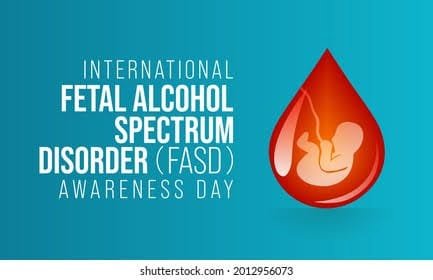International Fetal Alcohol Spectrum Disorders Awareness Day ( FASD)– September 9, 2022, history quotes, tweet
Fetal Alcohol Spectrum Disorders Awareness Day (FASD) is marked on September 9 to raise awareness about the importance of an alcohol-free pregnancy. Countries, states, provinces, and towns all around the world issue proclamations against alcohol consumption during pregnancy. Since there is no known safe amount of alcohol that can be consumed during pregnancy, it is the responsibility of the whole community to support alcohol-free pregnancies.
Alcohol can cause severe physical, behavioral, and neurological difficulties in children that last for their whole lives. Join us as we create awareness of this important issue by celebrating International Fetal Alcohol Spectrum Disorders Awareness Day.
HISTORY OF INTERNATIONAL FETAL ALCOHOL SPECTRUM DISORDERS AWARENESS DAY

From the 1960s until the 1980s, alcohol was commonly used as a form of medication to stop or relax uterine contractions and prevent preterm labor. Developed by Dr. Fritz Fuchs, the method involved administering a small amount of alcohol to pregnant women. However, as the alcohol was given intravenously, the pregnant woman could still receive the treatment even after passing out, making her intoxicated.
The harmful effect of this form of treatment was not identified until two doctors raised an alarm. It was Dr’s Kenneth Lyons Jones and David Weyhe Smith of the University of Washington Medical School who first coined the term Fetal Alcohol Syndrome in 1973. They identified a pattern of the skull, facial, limb, and heart defects linked to prenatal growth deficiency and developmental delay in eight unrelated children born to alcoholic mothers.
Fetal alcohol characteristics are different from one child to another since the adverse impact of exposure depends on the timing and dose of alcohol used during pregnancy. This poses a challenge for diagnosticians because the absence of observable symptoms means it often goes undetected. However, memory problems, slow thinking, and hyperactive behavior are a few of the conditions that individuals living with F.A.S.D. typically experience.
The first International Fetal Alcohol Spectrum Disorders Awareness Day was celebrated on September 9, 1999. This day was conceptualized by Bonnie Buxton and Brian Philcox, parents of fetal alcohol children, and Teresa Kellerman, director of the FAS Community Resource Center in Arizona. September 9 was chosen so that on the ninth day of the ninth month of the year, the world will remember that during the nine months of pregnancy, women should abstain from alcohol.
CELEBRATING WITH WORLDTIMESHINDI RETWEET
INTERNATIONAL FETAL ALCOHOL SPECTRUM DISORDERS AWARENESS DAY TIMELINE
1725
The Doctors Express Concern
British physicians petition the House of Commons on the effects of alcohol consumption by pregnant mothers.
1973
The Condition is Given a Name
Doctors coin the term ‘Fetal Alcohol Syndrome’ and it continues to be used to date.
1996
The Emergence of New Definitions
The Institute of Medicine replaces ‘fetal alcohol effects’ with the terms ‘alcohol-related neurodevelopmental disorder’ and ‘alcohol-related birth defects.’
2017-2019
The Discovery of a Possible Cure
Researchers discover a possible cure for F.A.S.D. using neural stem cells.
HOW TO OBSERVE INTERNATIONAL FETAL ALCOHOL SPECTRUM DISORDERS AWARENESS DAY
Put on red shoes and stand out
Join the ‘Red Shoes Rock’ campaign, which was created by RJ Formanek, an adult living with F.A.S.D. He decided to wear red shoes to stand out and have fun starting F.A.S.D. conversations with other people.
Organize a local F.A.S.D awareness event
Host an F.A.S.D. awareness event in your community. Distribute fact sheets about the condition so that more people get to know about it.
Share on social media
Post information on social media to create more awareness about F.A.S.D. Remember to use #FASDAwareness when posting.
5 FACTS ABOUT ALCOHOL YOU SHOULD KNOW
Worrying news from the CDC
The Centers for Disease Control and Prevention estimates that one in eight women drinks four or more alcoholic drinks at a time.
No alcohol is safe
All intoxicating beverages, regardless of alcohol percentage, are harmful to expecting women.
Avoiding alcohol can prevent birth defects
Alcohol consumption is the leading preventable cause of birth defects and developmental disorders in the U.S.
More experts can help children with F.A.S.D.
Specialists such as developmental pediatricians, child psychologists, or clinical geneticists help in diagnosing and treating children with F.A.S.D.
Gain understanding through F.A.S.D. advice cards
Australia has wallet-sized F.A.S.D. advice cards. Parents and guardians hand these out to onlookers if their children experience a sensory overload in public.
WHY INTERNATIONAL FETAL ALCOHOL SPECTRUM DISORDERS AWARENESS DAY IS IMPORTANT
It promotes good health
Since F.A.S.D. is preventable, pregnant women avoiding alcohol are assured that their babies are born healthy.
It raises awareness
More people need to know about the perils of alcohol consumption during pregnancy. This day is perfect for creating awareness.
It’s great for families
When babies are born healthy, families rejoice. This holiday contributes to more healthy children and happy families.
INTERNATIONAL FETAL ALCOHOL SPECTRUM DISORDERS AWARENESS DAY FAQS.
Can you prevent F.A.S.D.?
Fetal Alcohol Spectrum Disorders are entirely preventable if a baby is not exposed to alcohol before birth.
What are the types of F.A.S.D.?
There are three types of F.A.S.D. namely, fetal alcohol syndrome, alcohol-related birth defects, and alcohol-related neurodevelopmental disorder.
Is F.A.S.D. curable?
There is no cure for F.A.S.D. While it is a permanent condition, early intervention treatment can aid a child’s development.
Sandeep Raiza — Content Writer, Website Designer, SEO Strategist, and WordPress Expert AI specialist delivering impactful digital solutions that drive business growth.Combining creative storytelling with technical expertise.




